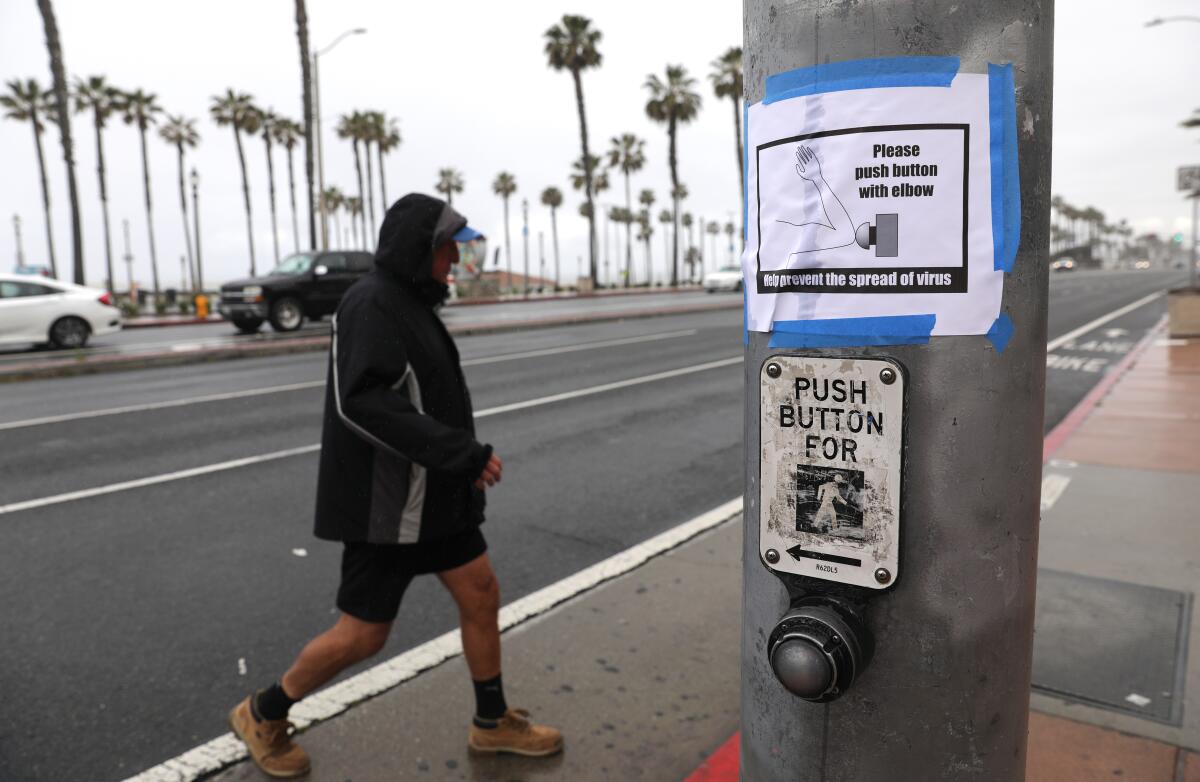Newsom vetoes jaywalking bill aimed at easing fines, targeted enforcement

- Share via
SACRAMENTO — Gov. Gavin Newsom vetoed a bill Friday that would have allowed people to cross the street outside of crosswalks when cars were not present without facing the possibility of a pricey jaywalking ticket.
Assemblyman Phil Ting (D-San Francisco) authored Assembly Bill 1238, saying the fees of up to $250 are burdensome and unnecessary in instances where there are no cars posing a risk to pedestrians. Ting also pointed to a 2015 law requiring local law enforcement agencies to report demographic information to the Attorney General’s office, which has shown that Black residents are disproportionally stopped by police for jaywalking.
“I am concerned that AB 1238 will unintentionally reduce pedestrian safety and potentially increase fatalities or serious injuries caused by pedestrians that enter our roadways at inappropriate locations,” Newsom wrote in a veto message. “I am committed to working with the author, the Legislature, and stakeholders on legislation that addresses the unequal enforcement of jaywalking laws in a manner that does not risk worsening California’s pedestrian safety.”
Under AB 1238, the California Highway Patrol would have been required to provide an annual report to the Legislature beginning in 2023 detailing pedestrian injuries and fatalities. It still would have been illegal to create a hazard in the roadway or to cross the street in a reckless manner under the bill.
“California’s jaywalking laws are outdated and not enforced fairly across our communities,” Ting said in a statement prior to the veto. “These laws do not protect pedestrians and instead burden people with unaffordable fines and subject marginalized communities to harassment by law enforcement. Unfortunately, some of these encounters with law enforcement become life threatening.”
The California State Sheriffs’ Assn. opposed the bill, arguing that it creates unpredictable road situations that could endanger the safety of pedestrians and motorists.
“Allowing pedestrians to enter roadways at effectively any place or any time where no ‘immediate hazard exists’ will cause confusion and remove expectations drivers and pedestrians may have about safe roadway usage,” the sheriffs wrote in opposition.
In March, Virginia became the first state to allow jaywalking without the risk of a fine by making it a secondary offense, meaning a pedestrian can’t be stopped for the sole reason of crossing the street illegally. California already eased some restrictions in 2018 by making it legal to enter a crosswalk after the pedestrian meter begins as long as a person successfully crosses before the timer ends.
AB 1238 was supported by the California Bicycle Coalition, California Walks, Los Angeles Walks and the Lawyers’ Committee for Civil Rights of the San Francisco Bay Area. Supporters said jaywalking laws are intended to make roads safer, but they actually end up discouraging walking as a mode of transportation.
“In the absence of safe and accessible pedestrian infrastructure, residents do their best to access school, work, grocery stores or parks,” Jared Sanchez of the California Bicycle Coalition said in a statement. “At times, this may involve jaywalking. Continuing to criminalize rational, predictable responses to poor infrastructure is unjust.”
More to Read
Sign up for Essential California
The most important California stories and recommendations in your inbox every morning.
You may occasionally receive promotional content from the Los Angeles Times.














